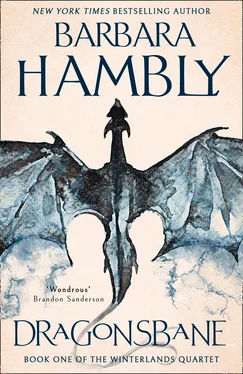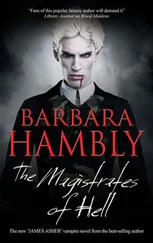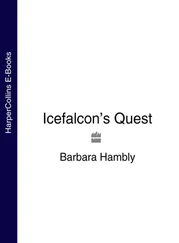The phosphorescent glow that illuminated the room outlined the shape of a narrow table and three small shelves. They held things that had belonged to the cold-eyed ice-witch who had been John’s mother, or to Caerdinn—simple things, a few bowls, an oddly shaped root, a few crystals like fragments of broken stars sent for mending. Pulling her robe more closely about her, Jenny took from its place a plain pottery bowl, so old that whatever designs had once been painted upon its outer surface had long since been rubbed away by the touch of mages’ hands. She dipped it into the stone vessel of water that stood in a corner and set it upon the table, drawing up before it a tall, spindle-legged chair.
For a time she only sat, gazing down into the water. Slips of foxfire danced on its black surface; as she slowed her breathing, she became aware of every sound from the roaring of the rain gusts against the tower’s walls to the smallest drip of the eaves. The worn tabletop was like cold glass under her fingertips; her breath was cold against her own lips. For a time she was aware of the small flaws and bubbles in the glaze of the bowl’s inner surface; then she sank deeper, watching the colors that seemed to swirl within the endless depths. She seemed to move down toward an absolute darkness, and the water was like ink, opaque, ungiving.
Gray mists rolled in the depths, then cleared as if wind had driven them, and she saw darkness in a vast place, pricked by the starlike points of candleflame. An open space of black stone lay before her, smooth as oily water; around it was a forest, not of trees, but of columns of stone. Some were thin as silk, others thicker than the most ancient of oaks, and over them swayed the shadows of the dancers on the open floor. Though the picture was silent, she could feel the rhythm to which they danced—gnomes, she saw, their long arms brushing the floor as they bent, the vast, cloudy manes of their pale hair catching rims of firelight like sunset seen through heavy smoke. They danced around a misshapen stone altar, the slow dances that are forbidden to the eyes of the children of men.
The dream changed. She beheld a desolation of charred and broken ruins beneath the dark flank of a tree-covered mountain. Night sky arched overhead, wind-cleared and heart-piercingly beautiful. The waxing moon was like a glowing coin; its light touching with cold, white fingers the broken pavement of the empty square below the hillside upon which she stood, edging the raw bones that moldered in puddles of faintly smoking slime. Something flashed in the velvet shadow of the mountain, and she saw the dragon. Starlight gleamed like oil on the lean, sable sides; the span of those enormous wings stretched for a moment like a skeleton’s arms to embrace the moon’s stern face. Music seemed to drift upon the night, a string of notes like a truncated air, and for an instant her heart leaped toward that silent, dangerous beauty, lonely and graceful in the secret magic of its gliding flight.
Then she saw another scene by the low light of a dying fire. She thought she was in the same place, on a rise overlooking the desolation of the ruined town before the gates of the Deep. It was the cold hour of the tide’s ebbing, some hours before dawn. John lay near the fire, dark blood leaking from the clawed rents in his armor. His face was a mass of blisters beneath a mask of gore and grime; he was alone, and the fire was dying. Its light caught a spangle of red from the twisted links of his torn mail shirt and glimmered stickily on the upturned palm of one blistered hand. The fire died, and for a moment only starlight glittered on the pooling blood and outlined the shape of his nose and lips against the darkness.
She was underground once more, in the place where the gnomes had danced. It was empty now, but the hollow silences beneath the earth seemed filled with the inchoate murmur of formless sound, as if the stone altar whispered to itself in the darkness.
Then she saw only the small flaws in the glaze of the bowl, and the dark, oily surface of the water. The witchlight had long ago failed above her head, which ached as it often did when she had overstretched her power. Her body felt chilled through to the bones, but she was for a time too weary to move from where she sat. She stared before her into the darkness, listening to the steady drum of the rain, hurting in her soul and wishing with all that was in her that she had not done what she had done.
All divination was chancy, she told herself, and water was the most notorious liar of all. There was no reason to believe that what she had seen would come to pass.
So she repeated to herself, over and over, but it did no good. In time she lowered her face to her hands and wept.

THEY SET FORTH two days later and rode south through a maelstrom of wind and water.
In the days of the Kings, the Great North Road had stretched from Bel itself northward like a gray stone serpent, through the valley of the Wildspae River and across the farm and forest lands of Wyr, linking the southern capital with the northern frontier and guarding the great silver mines of Tralchet. But the mines had flagged, and the Kings had begun to squabble with their brothers and cousins over the lordship of the south. The troops who guarded the Winterlands’ forts had been withdrawn—temporarily, they said, to shore up the forces of one contender against another. They had never returned. Now the gray stone serpent was disintegrating slowly, like a shed skin; its stones were torn up to strengthen house walls against bandits and barbarians, its ditches choked with decades of detritus, and its very foundations forced apart by the encroaching tree roots of the forest of Wyr. The Winterlands had destroyed it, as they destroyed all things.
Traveling south along what remained of the road was slow, for the autumn storms swelled the icy becks of the moors to white-toothed torrents and reduced the ground in the tree-tangled hollows to sodden, nameless mires. Under the flail of the wind, Gareth could no longer argue that the ship upon which he had come north would still be waiting at Eldsbouch to waft them south in relative comfort and speed, but Jenny suspected he still felt in his heart that it should have been, and, illogically, blamed her that it was not.
They rode for the most part in silence. Sometimes when they halted, as they frequently did for John to scout the tumbled rocks or dense knots of woodland ahead, Jenny looked across at Gareth and saw him gazing around him in a kind of hurt bewilderment at the desolation through which they rode: at the barren downs with their weed-grown lines of broken walls; at the old boundary stones, lumpish and melted-looking as spring snowmen; and at the stinking bogs or the high, bare tors with their few twisted trees, giant balls of mistletoe snagged weirdly in their naked branches against a dreary sky. It was a land that no longer remembered law or the prosperity of ordered living that comes with law, and sometimes she could see him struggling with the understanding of what John was offering to buy at the stake of his life.
But usually it was plain that Gareth simply found the halts annoying. “We’re never going to get there at this rate,” he complained as John appeared from the smoke-colored tangle of dead heather that cloaked the lower flanks of a promontory that hid the road. A watchtower had once crowned it, now reduced to a chewed-looking circle of rubble on the hill’s crest. John had bellied up the slope to investigate it and the road ahead and now was shaking mud and wet out of his plaid. “It’s been twenty days since the dragon came,” Gareth added resentfully. “Anything can have happened.”
Читать дальше







